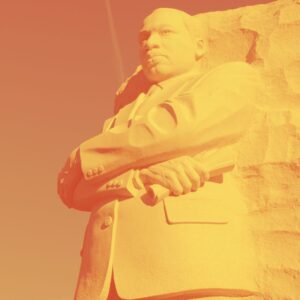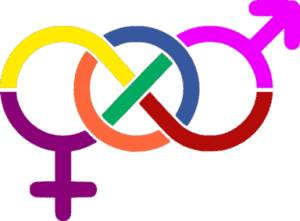Last year, under the heat of the Chicago sun, I marched in the Pride parade for the first time. Side-by-side with over 50 of my fellow congregants from Urban Village Church, we were a sea of smiles, hugs, and cheers, weaving through the crowd for two whole miles. But what truly etched itself in my memory were the faces of the youth who attended—some with a spark of curiosity, others with a newfound sense of belonging. As our group passed, I had the privilege of celebrating them along the parade route. A high-five, a hug, or a simple wave—any interaction seemed to light up their faces, especially when they saw the black power fist emblazoned on my pride flag. At that moment, I felt a powerful sense of connection and an opportunity to create a space where everyone felt free to be themselves.
As we navigate through June, we find ourselves in a month of profound significance: Juneteenth and LGBTQ+ Pride. These celebrations might initially seem like they belong to different worlds, but they are deeply interconnected through the shared pursuit of freedom, justice, and human dignity.
Pride isn’t just a flamboyant parade; it’s a powerful protest against laws that have oppressed queer people for generations. The colorful expressions and joyous celebrations are acts of defiance and resilience, asserting our right to exist and thrive. Similarly, Juneteenth, which marks the day when the last enslaved people in Galveston, Texas, were finally informed of their freedom—2.5 years after the Emancipation Proclamation—is a stark reminder of delayed justice and the long journey toward true liberation.
These realizations brought home a powerful truth: “None of us are free until all of us are free.” This statement resonates profoundly in both contexts. Our work is far from over. We must continue to push forward, not just for our own freedoms but for the freedoms of all marginalized communities.
As we celebrate Juneteenth and LGBTQ+ Pride this month, let’s use these moments as springboards for meaningful conversations with friends and family. Let’s challenge ourselves to understand the experiences of those around us and actively listen to their stories. We can create a more inclusive and just world by fostering empathy and open dialogue. There are countless ways to get involved beyond conversation, from volunteering with local organizations to supporting Black-owned businesses online and in your community. Let’s not let these celebrations be fleeting moments but instead ongoing commitments to justice.
Let’s keep the momentum going and celebrate freedom, dignity, and love for all.
In solidarity and love,
– Darren Calhoun (he/him)
Darren Calhoun (he/him) is a justice advocate, worship leader, and artist based out of Chicago and the Associate Fellow at CSA. In addition to his work with Oriented to Love, Darren serves as Digital Pastor and Worship Leader at Urban Village Church, sings for The Many, and co-hosts the Second Sunday podcast.


